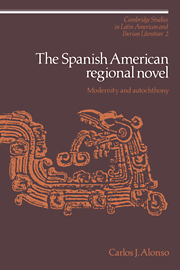I - Introduction: the exoticism of the autochthonous
Published online by Cambridge University Press: 08 September 2009
Summary
Therein lies the gist of the American's terrible complex: the belief that his expression is not accomplished form, but rather a problem, something to be resolved. Fatigued and inhibited by such presumptuous complexes, he seeks in autochthony the luxury that escaped him; and cornered between this insignificance and the mirage of European accomplishments he examines his facts.
José Lezama LimaIn a remarkable piece called “The Argentine Writer and Tradition” – a title not unrelated to that of T. S. Eliot's powerful and enduring essay – Borges attempted to come to terms with the then contested issue of writing within a national literary tradition. His observations on the subject seem to exhibit at times both the hindsight of someone who had not remained unmoved in the early part of his career by the appeal of autochthonous materials, and the uncanny desire to articulate a proleptic rejoinder to a number of his future critics. From the outset Borges characterizes the concern for an indigenous literature as a “pseudo-problem,” and goes on to show the historical contingency of the expectation – the requirement in the eyes of some – that literature and nationality be somehow intertwined:
Besides, I do not know if it is necessary to say that the idea that a literature must be defined in terms of its national traits is a relatively new idea; also new and arbitrary is the idea that writers must seek themes from their own countries. Without going any further, I think Racine would not have even understood a person who denied him his right to the title of French poet because he cultivated Greek and Roman themes. […]
- Type
- Chapter
- Information
- The Spanish American Regional NovelModernity and Autochthony, pp. 1 - 37Publisher: Cambridge University PressPrint publication year: 1989



